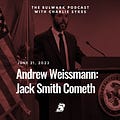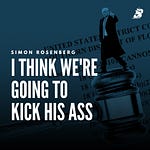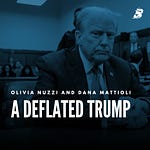Special Counsel Jack Smith is racing the clock, Justices Alito and Thomas seem to be taking cues from Donald Trump's "What are you gonna do about it?" approach to following rules, Republicans are against the IRS and gun laws unless Hunter is involved, and Barr's about-face is way too little, way too late. Andrew Weissmann joins Charlie Sykes today.
Share this post

Andrew Weissmann: Jack Smith Cometh
www.thebulwark.com
Andrew Weissmann: Jack Smith Cometh
Ad-Free Version
Jun 21, 2023
∙ Paid
The Bulwark Podcast
Audio
Tim Miller and guests discuss the latest political news for the flagship podcast of the Never Trump movement and the reality-based community. Every weekday we provide insightful analysis, political hot-takes, an unabashed defense of liberal democracy and long-form interviews that cut through the "both-sides" BS. Plus a few laughs to help you wash down the crazy.
An ad-free edition is exclusively available for Bulwark+ members.
Tim Miller and guests discuss the latest political news for the flagship podcast of the Never Trump movement and the reality-based community. Every weekday we provide insightful analysis, political hot-takes, an unabashed defense of liberal democracy and long-form interviews that cut through the "both-sides" BS. Plus a few laughs to help you wash down the crazy.
An ad-free edition is exclusively available for Bulwark+ members.Listen on
Substack App
Apple Podcasts
Spotify
YouTube Music
YouTube
Overcast
Pocket Casts
RSS Feed
Recent Episodes













